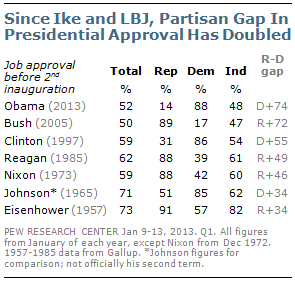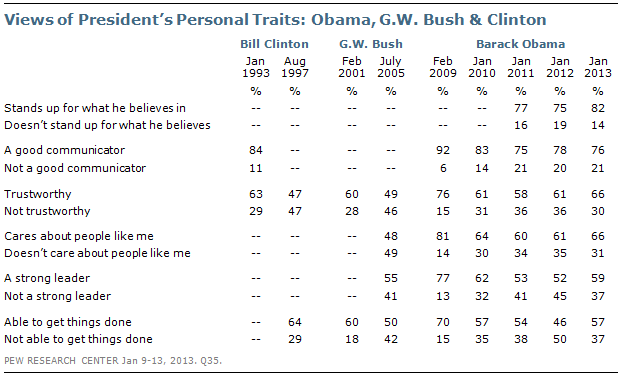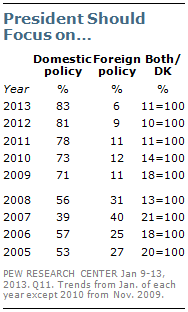 Barack Obama is in a relatively strong position heading into his second term. His job approval now stands at 52% – among the highest since his first year in office. A year ago, 44% said they approved of the way Obama was handling his job as president.
Barack Obama is in a relatively strong position heading into his second term. His job approval now stands at 52% – among the highest since his first year in office. A year ago, 44% said they approved of the way Obama was handling his job as president.
Both Democrats and independents offer more positive assessments than they did a year ago. Fully 88% of Democrats approve of the job he is doing, up nine points from January 2012. Nearly half of independents (48%) now approve of the way the president is handling his job. In January 2012, just 37% of independents approved while 56% disapproved.
Obama’s personal favorability rating also has improved from 51% a year ago to 59% today. And more see the president as a strong leader and able to get things done. A 59% majority say Obama is a strong leader, up from 52% a year ago. And 57% say the president is able to get things done, up 11 points from January 2012.
While Republicans have changed little in their views of Obama from a year ago, more Democrats say he is a strong leader (up nine points to 89%) and is able to get things done (up 16 points to 85%). Independents also offer more positive assessments of Obama; 55% say he is a strong leader, an 11-point increase from last year. About half (51%) of independents say he is able to get things done, up from 41% a year ago.
 At the same time, Obama’s job approval is lower than other presidents at the start of their second terms dating back to Dwight Eisenhower, with the exception of George W. Bush. Obama’s 52% job approval is about the same as Bush’s was in January 2005 (50%).
At the same time, Obama’s job approval is lower than other presidents at the start of their second terms dating back to Dwight Eisenhower, with the exception of George W. Bush. Obama’s 52% job approval is about the same as Bush’s was in January 2005 (50%).
To a large extent, Obama’s and Bush’s lower approval ratings reflect the increased polarization during their presidencies (for more see, Partisan Polarization Surges in Bush, Obama Years). Just 14% of Republicans approve of the way Obama is handling his job as president. That is similar to the 17% of Democrats who approved of Bush’s job performance in January 2005, but both are far lower than the ratings their predecessors received from members of the opposite party. In addition, independents rate Obama and Bush lower than most other presidents at their start of their second term.
 Even in this hyper-partisan environment, however, Republicans do give some positive assessments of the president. Fully 64% of Republicans say the president stands up for his beliefs and 59% say he is a good communicator. Republicans are more critical when it comes to other traits. Only about a third say Obama is trustworthy or cares about people like them (32% each) and just 25% say he is a strong leader.
Even in this hyper-partisan environment, however, Republicans do give some positive assessments of the president. Fully 64% of Republicans say the president stands up for his beliefs and 59% say he is a good communicator. Republicans are more critical when it comes to other traits. Only about a third say Obama is trustworthy or cares about people like them (32% each) and just 25% say he is a strong leader.
Democrats offer very positive ratings of Obama on all of these traits. Nearly all say he stands up for what he believes in (96%), is trustworthy (95%) and that he cares about people like them (95%). Nine-in-ten (90%) say he is a good communicator, and nearly as many say he is a strong leader (89%) and able to get things done (85%).
The views of independents largely mirror the public overall. Most say he stands up for what he believes in (83%) and that the president is a good communicator (75%). Majorities also say he cares about people like them (65%) and is trustworthy (63%).
In historical context, these are relatively good measures for Obama when compared with other recent presidents early in their second terms. About six-months into their second term, only about half said that Bill Clinton (47%) and Bush (49%) were trustworthy, compared with 66% who say this about Obama. In 1997, a majority (64%) said that Clinton was able to get things done. Today, slightly fewer (57%) say this about Obama. The public was more divided about Bush’s effectiveness in July 2005: 50% said he was able to get things done while 42% thought he was not able to get things done.

 One area where there is overwhelming partisan agreement is on whether the president should focus on domestic or foreign policy right now. Overall, 83% say the president should focus his energies on domestic issues; just 6% say foreign policy should be the president’s focus right now. These numbers are largely unchanged from a year ago. Nearly nine-in-ten (88%) Democrats and about eight-in-ten Republicans (81%) and independents (83%) say that domestic policy is most important at this time.
One area where there is overwhelming partisan agreement is on whether the president should focus on domestic or foreign policy right now. Overall, 83% say the president should focus his energies on domestic issues; just 6% say foreign policy should be the president’s focus right now. These numbers are largely unchanged from a year ago. Nearly nine-in-ten (88%) Democrats and about eight-in-ten Republicans (81%) and independents (83%) say that domestic policy is most important at this time.
During George W. Bush’s tenure, far more said foreign policy should be the priority than do so now. But even at the start of his second term, 53% said he should focus on domestic policy while 27% said foreign policy should be the priority.
Favorability of the Obamas
 Barack Obama is viewed more favorably at the start of his second term than he was during the 2012 campaign. By a 59% to 38% margin more now view the president favorably than unfavorably. However, views of the president are more negative than they were just before taking office in January 2009 when 79% had a favorable view of the incoming president.
Barack Obama is viewed more favorably at the start of his second term than he was during the 2012 campaign. By a 59% to 38% margin more now view the president favorably than unfavorably. However, views of the president are more negative than they were just before taking office in January 2009 when 79% had a favorable view of the incoming president.
Michelle Obama continues to be viewed more positively than her husband. Two-thirds (67%) of Americans say they have a favorable opinion of the first lady, while just 22% have an unfavorable opinion. These views have changed little over the past year and are comparable to the ratings she received four years ago.
 The president’s favorability ratings are particularly high among blacks (90% favorable), Hispanics (85% favorable) and young people (74% favorable). Fully 93% of Democrats view Obama favorably, compared with just 21% of Republicans. Among independents, more view him favorably than unfavorably by a 55% to 40% margin.
The president’s favorability ratings are particularly high among blacks (90% favorable), Hispanics (85% favorable) and young people (74% favorable). Fully 93% of Democrats view Obama favorably, compared with just 21% of Republicans. Among independents, more view him favorably than unfavorably by a 55% to 40% margin.
Impressions of the first lady are quite positive among most groups. About nine-in-ten Democrats (91%), as well as 65% of independents view her favorably. Republicans are more divided: 42% have a favorable impression of Michelle Obama while 45% have an unfavorable view.
Among Republicans there are differences in opinion by ideology. About half (52%) of moderate and liberal Republicans view the first lady favorably compared with just 38% of conservative Republicans.


 Timeline
Timeline